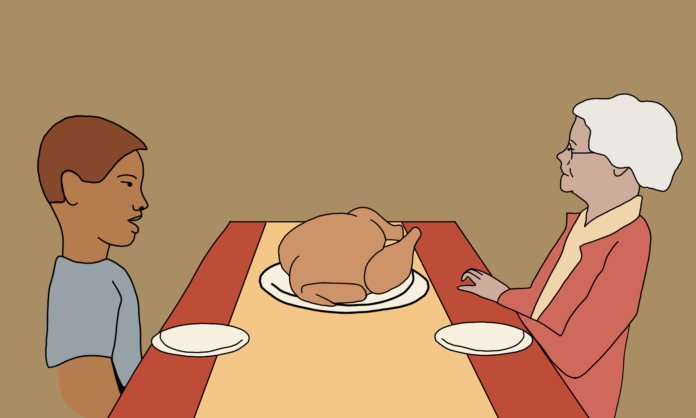Politics, religion and money are three subjects that we are all told to avoid at family gatherings, yet at the end of the night a fight breaks out about one of these and ruins the peace.
With Thanksgiving around the corner, some students are beginning to anticipate these kinds of conversations with their immediate and distant family members. Around this time of year, there is no shortage of jokes about that one aunt or uncle’s inappropriate remarks on the Internet.
However, 2020 has been a disappointing and polarizing year for everyone. And for some, this holiday season will be the first time they talk to their family in-person after a long, long time.
At this point, there’s no way to avoid subjects like the presidential election or the validity of coronavirus concerns, so it would be best to take control of the situation. This year of all years, we shouldn’t shy away from these conversations that need to happen.
Talking politics is stressful, but it doesn’t have to be. Today, the political climate has created a deterioration of civil discourse. Contempt and divisiveness saturate this country, and many of us see our neighbors, friends and even family as something less than human because of their political beliefs.
But if we keep avoiding these conversations until outbursts of emotion erupt, we will never be able to change anything about this divide. And if we can’t even have these conversations with the people closest to us and the people who are supposed to love us unconditionally, how will we have these conversations with total strangers?
In order to prevent Thanksgiving or Christmas dinner from becoming a screaming match, you must set up some sort of boundaries. One example stems from the continually polarizing subject of COVID-19. Because of coronavirus, some of us may be enjoying Thanksgiving dinner over Zoom calls or only in-person after tests and extensive amounts of self-quarantining.
Some students may be going home to parents or grandparents who have forgone all precautions. It’s been a long year and, depending on the state they live in, they might be trying to return to normal.
However, it’s valid to feel frustrated with them. Some students are taking COVID-19 extra seriously these last few weeks leading up to the holiday season in order to protect these same family members. It makes sense to be angry when the people you are trying to protect are not trying to protect themselves or you.
If you can, have a conversation with these relatives. Start it in the most calm way possible, describe their actions and explain why they make you feel uncomfortable, unappreciated or unsafe. Then, ask them for what you need from them whether that be to wear a mask in your presence or take a COVID-19 test before getting together.
For those who are not as concerned with the pandemic as their family members, remember that they are human, too. They are not trying to restrict you. The precautions taken because of the pandemic are not about restrictions or limits, they are all about empathy. Consider their perspective. Listen to them when they tell you they don’t feel safe. And try your best to make them feel safe when you’re around them at the very least.
If this conversation doesn’t go as planned, wait a little bit and try again. But as it gets repetitive, it might be time to set up even stricter boundaries. If you feel safe enough, just avoid the subjects at the literal dinner table and save them for after when everyone is lounging around and full with turkey, stuffing and mashed potatoes.
Even though political and social discourse is necessary for this holiday season, maybe save it for after the pie and instead discuss the lighter things in life like what everyone’s been binging on Netflix or the music they have been listening to over turkey.
We must have these uncomfortable conversations this holiday season — from the election and foreign affairs and COVID-19 to racial injustice — but that doesn’t mean it has to be a fight.






